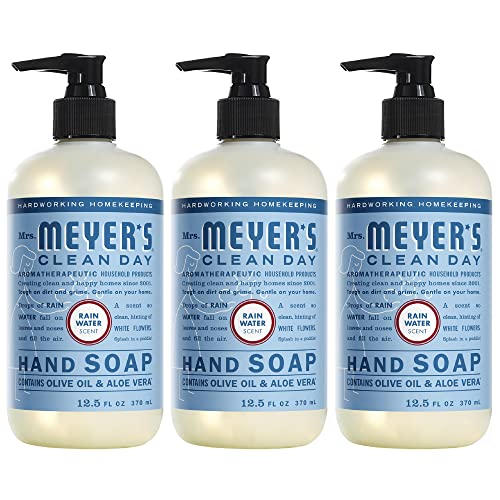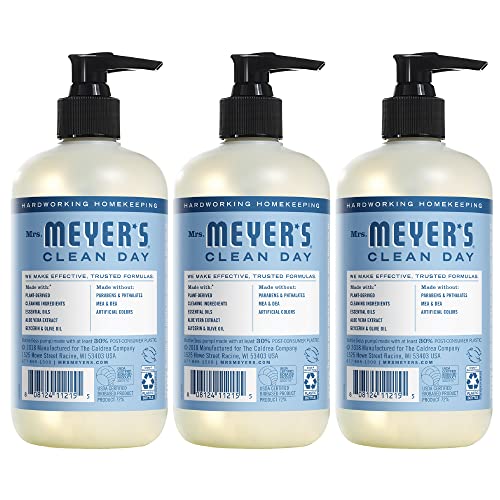

Babyganics Hand Soap - Mosquito Repellent, Plant & Essential Oils, 6oz - 2 Pack


Rosmarinus Officinalis (Rosemary) Leaf Oil
Medium RiskRosmarinus officinalis (rosemary) leaf oil is extracted from the leaves of the rosemary plant. It is commonly used in cosmetic and personal care products for its aromatic properties and potential preservative benefits due to its antioxidant content.
Sustai Insights
Rosemary leaf oil offers functional benefits such as antimicrobial and antioxidant properties, which can enhance product stability. It is derived from a renewable source and is biodegradable. However, it presents moderate risks of allergic reactions and skin irritation, particularly with enhanced skin absorption. Regulatory bodies have noted restrictions on its usage in specific concentrations. The overall risk level is assessed as medium. Users are advised to follow safe usage practices and may consider alternatives like tocopherols or other natural preservatives.
Cedarwood Oil
Low RiskCedarwood oil is an essential oil derived from cedar trees, primarily used for its aromatic properties and as a natural ingredient in personal care products. It serves various functions, including acting as a fragrance, a potential preservative, and an insect repellent.
Sustai Insights
Cedarwood oil offers functional benefits, such as providing a pleasant scent and potential preservation properties due to its antimicrobial effects. It is sustainably sourced and biodegradable. Health-wise, it has low concerns regarding carcinogenicity, allergies, and reproductive toxicity. Environmentally, it poses low risks as a pollutant and is not bioaccumulative. Regulatory bodies have not issued significant warnings, confirming its low-risk status. Safe usage practices should be followed, and alternatives include plant-based essential oils with similar benefits. Overall, cedarwood oil is assessed with a low risk level.
Glycine Soja (Soybean) Oil
Low RiskGlycine soja (soybean) oil is derived from the seeds of the soybean plant and is commonly used in cosmetic formulations for its emollient properties. It functions as a moisturizer and skin conditioning agent, enhancing the texture and feel of products.
Sustai Insights
Glycine soja (soybean) oil offers functional benefits such as effective skin moisturization and conditioning. It is generally recognized as low-risk for health concerns, with minimal allergenic potential and no significant environmental hazards reported. Regulatory bodies have not imposed restrictions on its use. Overall, this ingredient is assessed as low risk, making it a suitable option for various cosmetic applications.
Geranium Maculatum (Spotted Cranesbill) Oil
Low RiskGeranium maculatum oil is a volatile oil obtained from the spotted cranesbill plant, commonly used in various cosmetic and personal care products for its aromatic properties. It may also serve as a fragrance component and is recognized for its potential skin benefits.
Sustai Insights
Geranium maculatum oil offers functional benefits as a natural fragrance and potential skin-conditioning agent, contributing to product stability. It is sustainably sourced with low risk of environmental impact. Health risks are minimal, including low concerns for carcinogenicity, allergies, and reproductive toxicity. Regulatory status is favorable, with no current restrictions. Overall, the ingredient is assessed as low risk, with safe usage practices encouraged. Alternatives may include other essential oils with similar properties.
Mentha Piperita (Peppermint) Oil Extract
Low RiskMentha piperita (peppermint) oil extract is derived from the peppermint plant and is commonly used in various products for its aromatic and flavoring properties. It serves multiple functions, including acting as a fragrance agent and providing a cooling sensation in topical applications.
Sustai Insights
Mentha piperita oil offers functional benefits such as flavor enhancement and a refreshing aroma, while it is generally recognized as low risk for health concerns, including carcinogenicity and allergies. Environmentally, it does not contribute significantly to pollution or bioaccumulation. Regulatory bodies do not impose restrictions on its use. Safe usage practices include avoiding excessive exposure, particularly for sensitive individuals. Alternatives like spearmint oil may be considered, but overall, this ingredient is assessed as low risk.
Citronella
Low RiskCitronella is an essential oil derived from the leaves and stems of different species of Cymbopogon. It is commonly used as a fragrance in personal care products and as a natural insect repellent due to its distinct scent and properties.
Sustai Insights
Citronella is valued for its effective insect-repelling properties and pleasant fragrance, contributing to its use in various consumer products. It is generally considered safe, with low concerns regarding carcinogenicity, allergies, and reproductive toxicity. However, there are minor potential irritations for sensitive individuals. Environmentally, it poses low risks of pollution and bioaccumulation. Regulatory bodies have not placed significant restrictions on its use. Overall, the ingredient is assessed to have a low risk profile, making it a suitable option in formulations.
Cedarwood Oil
Low RiskCedarwood oil is an essential oil derived from cedar trees, primarily used for its aromatic properties and as a natural ingredient in personal care products. It serves various functions, including acting as a fragrance, a potential preservative, and an insect repellent.
Sustai Insights
Cedarwood oil offers functional benefits, such as providing a pleasant scent and potential preservation properties due to its antimicrobial effects. It is sustainably sourced and biodegradable. Health-wise, it has low concerns regarding carcinogenicity, allergies, and reproductive toxicity. Environmentally, it poses low risks as a pollutant and is not bioaccumulative. Regulatory bodies have not issued significant warnings, confirming its low-risk status. Safe usage practices should be followed, and alternatives include plant-based essential oils with similar benefits. Overall, cedarwood oil is assessed with a low risk level.
Glycine Soja (Soybean) Oil
Low RiskGlycine soja (soybean) oil is derived from the seeds of the soybean plant and is commonly used in cosmetic formulations for its emollient properties. It functions as a moisturizer and skin conditioning agent, enhancing the texture and feel of products.
Sustai Insights
Glycine soja (soybean) oil offers functional benefits such as effective skin moisturization and conditioning. It is generally recognized as low-risk for health concerns, with minimal allergenic potential and no significant environmental hazards reported. Regulatory bodies have not imposed restrictions on its use. Overall, this ingredient is assessed as low risk, making it a suitable option for various cosmetic applications.
Geranium Maculatum (Spotted Cranesbill) Oil
Low RiskGeranium maculatum oil is a volatile oil obtained from the spotted cranesbill plant, commonly used in various cosmetic and personal care products for its aromatic properties. It may also serve as a fragrance component and is recognized for its potential skin benefits.
Sustai Insights
Geranium maculatum oil offers functional benefits as a natural fragrance and potential skin-conditioning agent, contributing to product stability. It is sustainably sourced with low risk of environmental impact. Health risks are minimal, including low concerns for carcinogenicity, allergies, and reproductive toxicity. Regulatory status is favorable, with no current restrictions. Overall, the ingredient is assessed as low risk, with safe usage practices encouraged. Alternatives may include other essential oils with similar properties.
Mentha Piperita (Peppermint) Oil Extract
Low RiskMentha piperita (peppermint) oil extract is derived from the peppermint plant and is commonly used in various products for its aromatic and flavoring properties. It serves multiple functions, including acting as a fragrance agent and providing a cooling sensation in topical applications.
Sustai Insights
Mentha piperita oil offers functional benefits such as flavor enhancement and a refreshing aroma, while it is generally recognized as low risk for health concerns, including carcinogenicity and allergies. Environmentally, it does not contribute significantly to pollution or bioaccumulation. Regulatory bodies do not impose restrictions on its use. Safe usage practices include avoiding excessive exposure, particularly for sensitive individuals. Alternatives like spearmint oil may be considered, but overall, this ingredient is assessed as low risk.
Rosmarinus Officinalis (Rosemary) Leaf Oil
Medium RiskRosmarinus officinalis (rosemary) leaf oil is extracted from the leaves of the rosemary plant. It is commonly used in cosmetic and personal care products for its aromatic properties and potential preservative benefits due to its antioxidant content.
Sustai Insights
Rosemary leaf oil offers functional benefits such as antimicrobial and antioxidant properties, which can enhance product stability. It is derived from a renewable source and is biodegradable. However, it presents moderate risks of allergic reactions and skin irritation, particularly with enhanced skin absorption. Regulatory bodies have noted restrictions on its usage in specific concentrations. The overall risk level is assessed as medium. Users are advised to follow safe usage practices and may consider alternatives like tocopherols or other natural preservatives.
Citronella
Low RiskCitronella is an essential oil derived from the leaves and stems of different species of Cymbopogon. It is commonly used as a fragrance in personal care products and as a natural insect repellent due to its distinct scent and properties.
Sustai Insights
Citronella is valued for its effective insect-repelling properties and pleasant fragrance, contributing to its use in various consumer products. It is generally considered safe, with low concerns regarding carcinogenicity, allergies, and reproductive toxicity. However, there are minor potential irritations for sensitive individuals. Environmentally, it poses low risks of pollution and bioaccumulation. Regulatory bodies have not placed significant restrictions on its use. Overall, the ingredient is assessed to have a low risk profile, making it a suitable option in formulations.
Experience the power of nature with Babyganics Insect Spray, a safe and effective solution designed for your family. Made from plant and essential oils, this insect repellent effectively keeps mosquitoes and other pesky insects at bay while ensuring a gentle touch for your loved ones.
- Natural Ingredients: Crafted with a blend of citronella, peppermint, rosemary, lemongrass, and geranium oils, providing a refreshing scent while warding off insects.
- DEET-Free: Free from harsh chemicals, parabens, and synthetic fragrances, making it a safe choice for sensitive skin.
- Eco-Friendly: The biodegradable formula supports a healthier planet, appealing to environmentally conscious consumers.
- Family-Friendly: Designed for the whole family, ensuring that outdoor adventures are fun and comfortable without worrying about harmful chemicals.
- Cruelty-Free: Not tested on animals, aligning with ethical consumption values.
Trust in Babyganics to keep your family safe and protected, while also caring for the environment.
Subscribe & Save with Sustai
- Best Price Guarantee: Always enjoy the lowest prices on sustainable home essentials.
- No Surprises: We’ll notify you before shipping. No hidden fees, ever.
- You’re in Charge: Change, pause, or cancel your subscription anytime with ease.
- Eco-Friendly Deliveries: Our grouped shipments mean less packaging and lower emissions.
Join us on a sustainable journey. Special offers for a limited time! Prices and promotions may change.
Recommended Products
Experience the power of nature with Babyganics Insect Spray, a safe and effective solution designed for your family. Made from plant and essential oils, this insect repellent effectively keeps mosquitoes and other pesky insects at bay while ensuring a gentle touch for your loved ones.
- Natural Ingredients: Crafted with a blend of citronella, peppermint, rosemary, lemongrass, and geranium oils, providing a refreshing scent while warding off insects.
- DEET-Free: Free from harsh chemicals, parabens, and synthetic fragrances, making it a safe choice for sensitive skin.
- Eco-Friendly: The biodegradable formula supports a healthier planet, appealing to environmentally conscious consumers.
- Family-Friendly: Designed for the whole family, ensuring that outdoor adventures are fun and comfortable without worrying about harmful chemicals.
- Cruelty-Free: Not tested on animals, aligning with ethical consumption values.
Trust in Babyganics to keep your family safe and protected, while also caring for the environment.

You can have at most 2 Sustainable Steals products in your cart
Customer Reviews
Customers’ View
Customers appreciate the gentle and effective cleansing properties of the Hand Soap, particularly noting its formulation with natural ingredients like essential oils and aloe vera, which contribute to soft and nourished skin. Many users highlight the refreshing rainwater scent as a pleasant aspect, making handwashing a more enjoyable experience. The product's biodegradable formula and cruelty-free certification resonate with environmentally and health-conscious consumers, reinforcing its appeal as a safe choice for families. Overall, users find the soap to be a practical option that aligns with their sustainable lifestyle, providing both cleanliness and peace of mind.
AI-generated from the text of customer reviewsThis product has no reviews yet.




